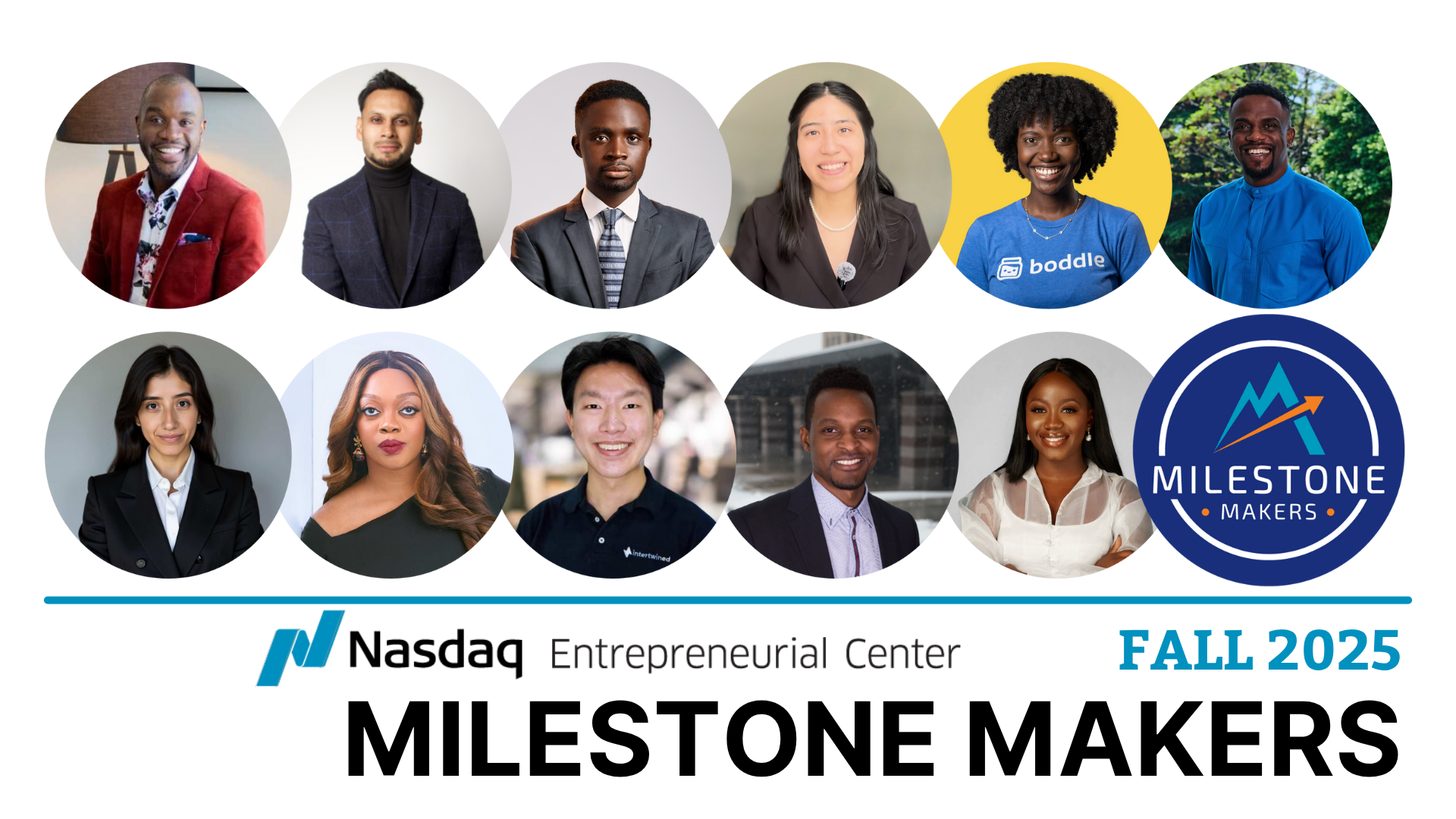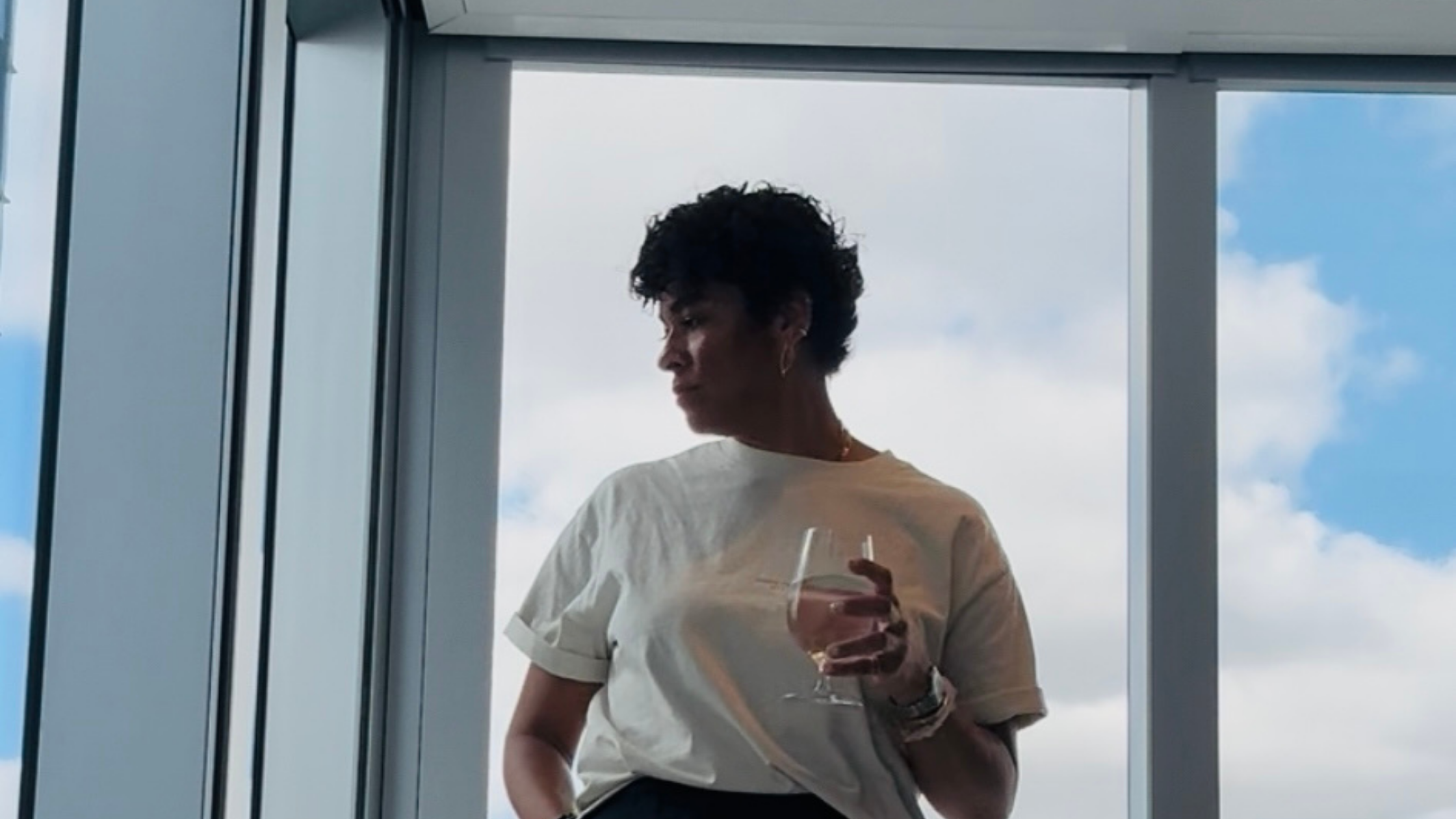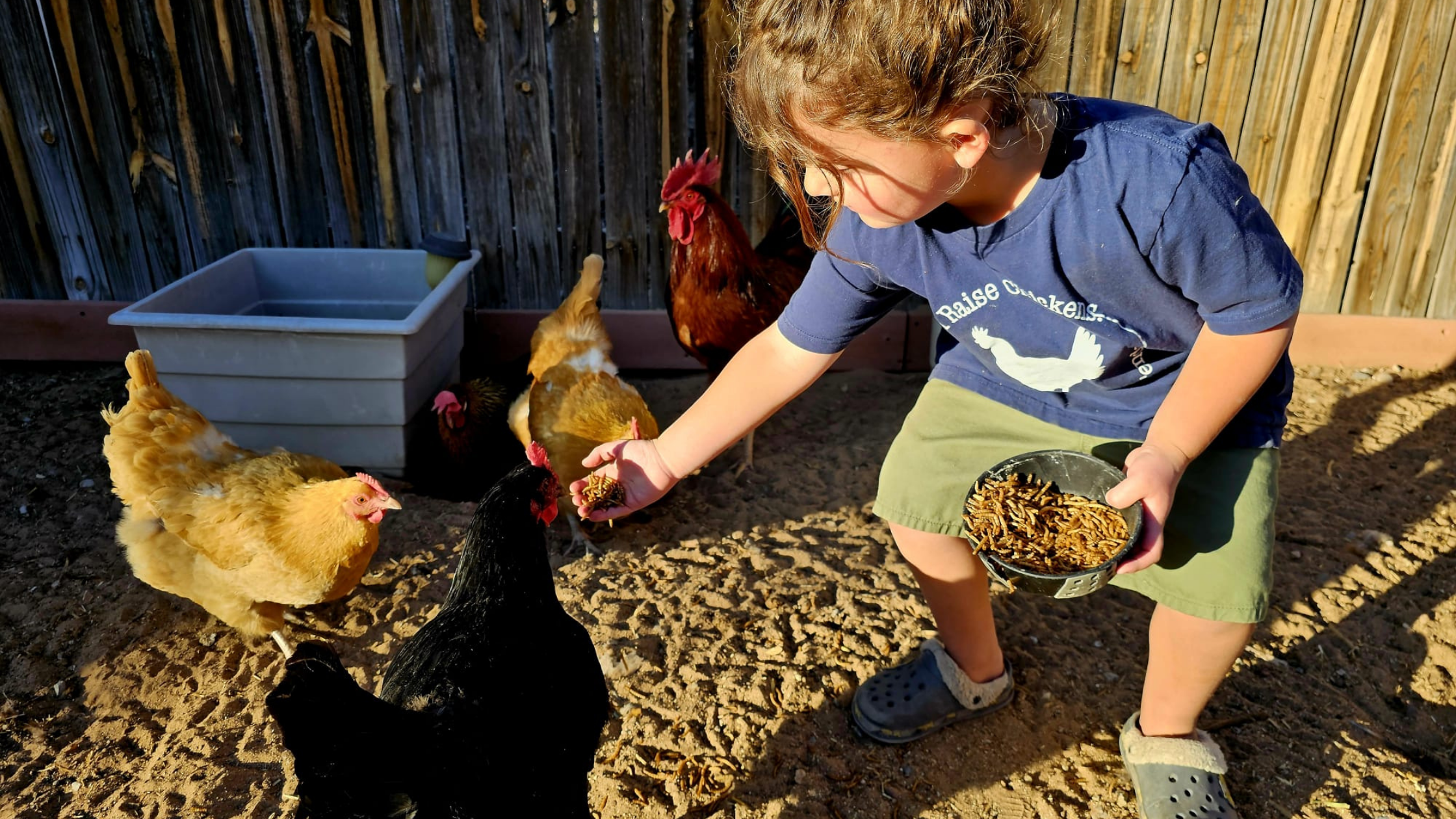Born in Pampas Grande, Peru, Pedro David Espinoza is an internet entrepreneur, angel investor, board member, TED speaker, and author. Pan Peru USA, which he founded in 2018, is a 501(c)3 social venture that empowers under-estimated Andean women to become entrepreneurs. Pan Peru trains these rural women to market, design, and monetize their handmade alpaca garments such as sweaters, mittens, and scarves which are then sold through the Pan Peru e-commerce platform. Proceeds go directly to these women.
What does “entrepreneurship” mean to you?
Pedro David Espinoza: Entrepreneurship means building relational bridges for others to grow. This relates to the work we are doing at Pan Peru, which is to empower under-estimated Hispanic women to become entrepreneurs.
How did your company come to be?
PDE: My family is from Pampas Grande, a pueblo 12,700 feet above sea level in the Peruvian Andes. It’s a 10-hour drive from Lima with very limited resources. During high school, I volunteered by helping to build the first computer lab and library in Pampas. I saw how young girls changed their mindset from being on farms to aspiring to becoming engineers, entrepreneurs, and scientists. In 2017, I gave a TED Talk on how to build bridges for others to succeed where I mentioned the work of Pan Peru.
How has your business changed in response to the COVID-19 pandemic?
PDE: The female entrepreneurs used to meet in the Pan Peru library (multimedia center) in Pampas Grande to produce the handmade alpaca products, however, due to COVID they have been knitting and working from home. Thanks to Pan Peru’s provision of facial masks and other equipment, the women were able to return to the Pan Peru library to work in teams.
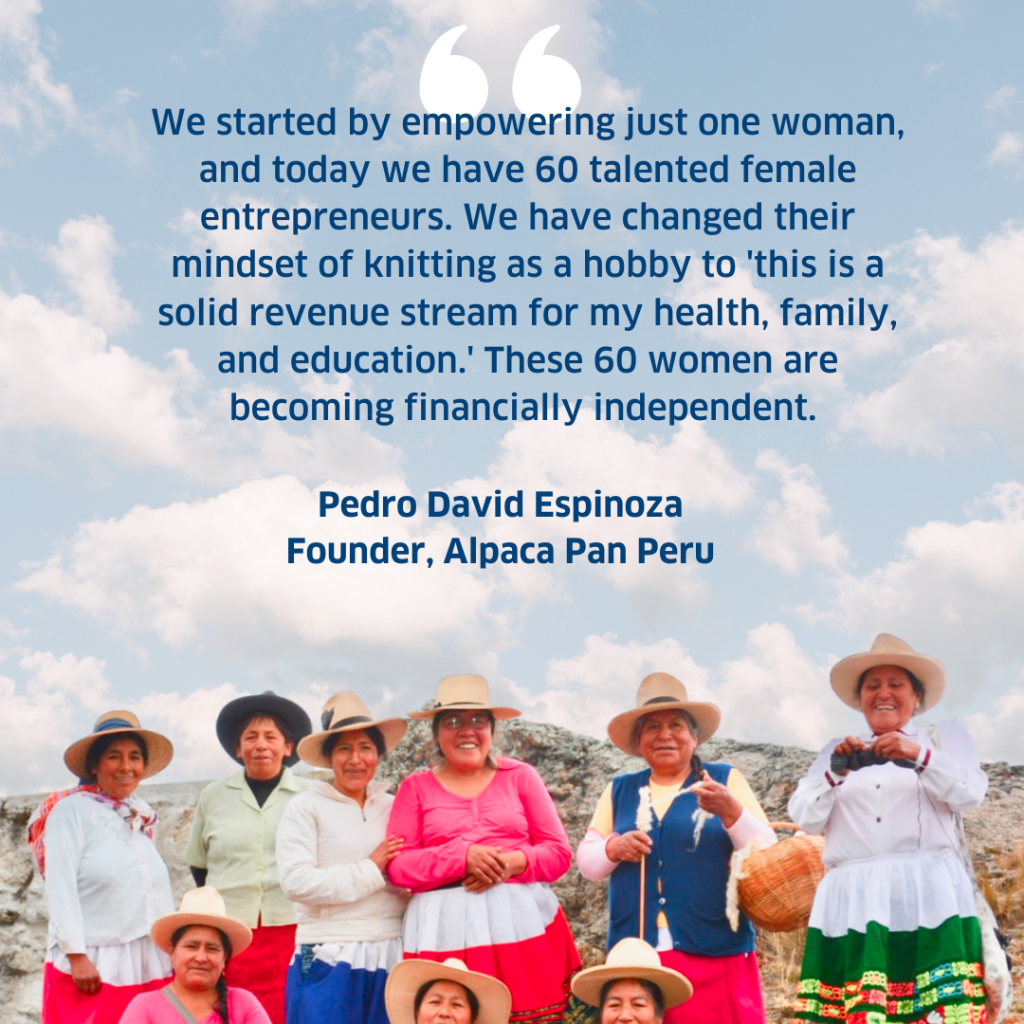 What is your proudest and darkest moment so far?
What is your proudest and darkest moment so far?
PDE: Our proudest moment was when our Pan Peru team realized we could leverage my book on diversity, speaking business on equity, and consulting venture on inclusion to loop in Pan Peru to close that virtuous circle. Companies like VMware, Oracle, or Adobe would hire me as a keynote speaker for Hispanic Heritage Month / Women’s International Day but also buy Alpaca swag made by the talented female entrepreneurs and give it to their executive team in addition to their employee resource groups. It was perfect! Tech companies buying handmade scarves by Peruvian women to support women entrepreneurship, and to give it to their diverse employees. Perfect circle of social impact. Since we are a 501c3 nonprofit organization, donations are tax-deductible which corporations love.
Big thanks to the tremendous support from tech leaders such as Amy Leong CMO of FormFactor, Daniel Trujillo Chief Compliance Officer of Walmart, and Jorge Mina from MSCI. Also, big kudos to my co-author Jorge Titinger for his logistical help with the products.
A key low from our entrepreneurial journey was because of COVID the airports in Peru were closed. Thus, we were unable to deliver some of the products in time to our U.S. customers. We apologized to our clients and explained that Peru was one of the worst countries when it came to dealing with COVID. The President of Peru was extremely strict and shut down everything. Hence, we couldn’t even use FedEx or DHL to ship the products because everything was closed in April 2020.
How is your company changing the landscape?
PDE: Peru is known for being a chauvinistic country, especially in the rural areas such as the Andean region. We started by empowering just one woman, and today we have 60 talented female entrepreneurs. We have changed their mindset of knitting as a hobby to this is a solid revenue stream for my health, family, and education. These 60 women are becoming financially independent. Most of them are single mothers and were discriminated against in the past.
What do you wish you knew when you started? Is there anything you would do differently?
PDE: For Alpaca Pan Peru specifically, we would have focused on one product: alpaca beanies. We started training the women to make sweaters, scarves, potholders, coasters, and other products. They had to learn different techniques and the logistics were getting slightly more difficult. Now, we focus on fewer products. That way our talented female entrepreneurs can become experts in making alpaca beanies of all colors.
What advice/credo do you live by as you grow the business / what is your professional and personal mission statement?
PDE: I work wholeheartedly for a greater purpose. It’s not about me.
Where do you find inspiration when faced with challenges?
PDE: Music, prayer, and community have helped me grow in the midst of trials. Although I’m not an excellent dancer by Peruvian standards, I truly enjoy jamming my guitar, dancing in my room, and laughing!
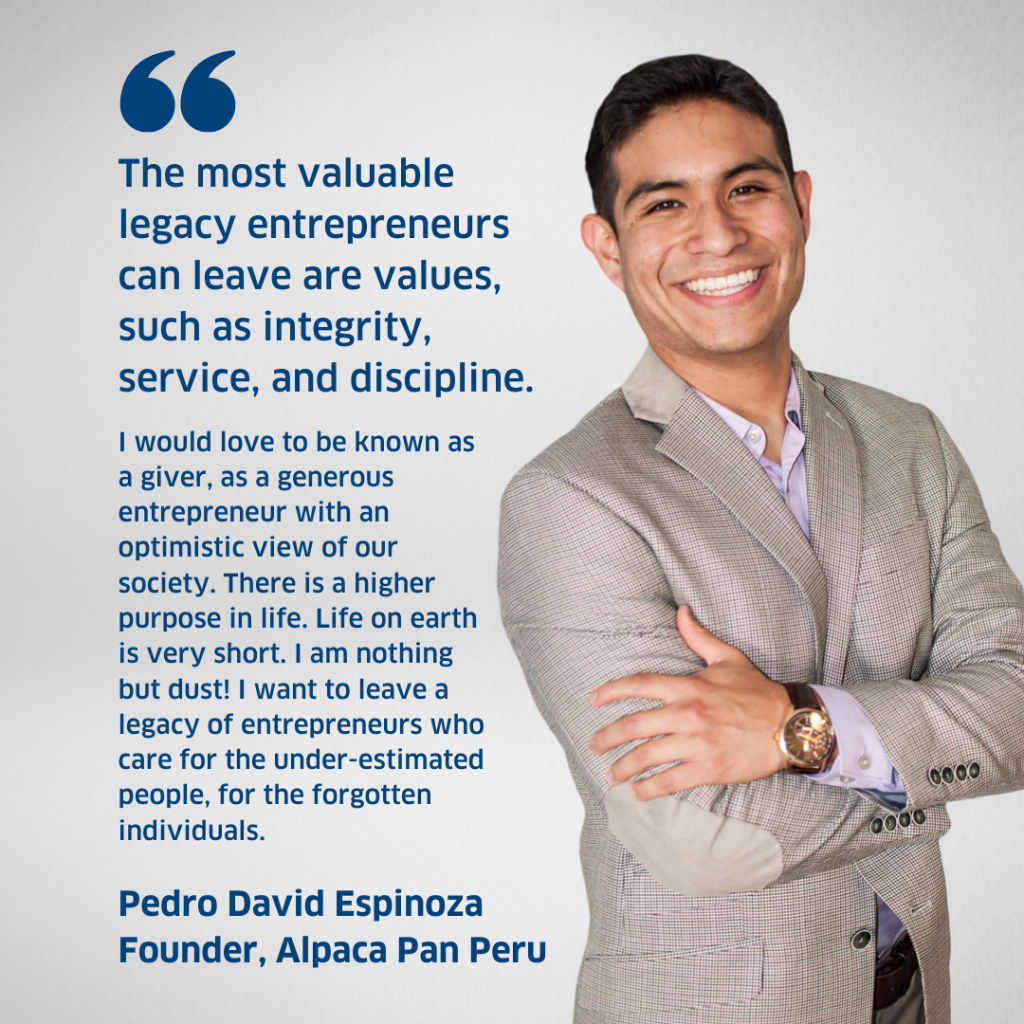 What does “success” look like for you? What do you think will help you achieve it? Has personal or professional “success” changed for you since the COVID-19 pandemic?
What does “success” look like for you? What do you think will help you achieve it? Has personal or professional “success” changed for you since the COVID-19 pandemic?
PDE: I’m a big believer in the value of family. Growing up in Peru, I loved seeing my family united. Given that my family is from Pampas Grande, Ancash (the place where we empower 60 women to become entrepreneurs) I see the success of these under-estimated women as my success. Whenever we bring more women to join the entrepreneurship program, I feel a sense of accomplishment given that these are extremely talented female leaders with so much potential. Talent is anywhere!
What’s it like to work alone or with your partners? What advice do you have for fellow entrepreneurs about building and leading teams?
PDE: Have an intimate, personal board of directors. I can’t express enough the power of having mentors, sponsors, and people who vouch for you. However, it’s very important to make it easy for people to help you and also: make sure to do your homework ahead of time. I’ll give you an example: I had the opportunity of befriending Bill Coleman (former CEO of Veritas, CEO of BEA Systems) through a Silicon Valley Leadership Group 2017 CEO trip to Washington D.C. where we met with legislators such as Kamala Harris and Nancy Pelosi to advocate for comprehensive immigration reform, entrepreneurship visa, and more H1B visas.
Through this trip, I learned about Bills’ roots, family, and values. He would share about the community work his wife Claudia did in Los Altos. I loved it! I shared with him my work at Pan Peru and how I would love to create similar programs here in the United States and other communities to keep empowering under-estimated women. Bill recommended a few books that I should read about entrepreneurship and leadership. I did. He was curious to learn more about my startup and asked for a deck. I sent it to him. Little by little we started building a friendship by eating breakfast at Rick’s Café in Los Altos and other places. It took years to build a trustworthy relationship (golden nugget: trust is a product of long-term relationships, not short-term) with Bill.
Eventually, when it was time to interview CEOs for my book on equity, Bill was the first person to volunteer to introduce me to Eric Schmidt (Google CEO), Doug Merritt (Splunk CEO), and Dan Schulman (PayPal CEO). I sent him forwardable emails he could forward to Eric, Doug, and Dan. He immediately did it. Next thing I know, I’m meeting Eric on Tuesday at 3pm pacific time. This took years though! It didn’t happen through a one day, week, or month relationship. My advice to entrepreneurs is to find mentors and sponsors, cherish those relationships! Give back, too. I knew Bill’s wife loved European art. When my co-author Jorge Titinger (former CEO of Silicon Graphics International and Verigy) told me his mom (an artist) had some amazing European pieces of art, I told Jorge I wanted one to give to Bill & Claudia Coleman. Done!
Many entrepreneurs continue to perfect their daily routines to support their work and greater vision; would you mind sharing your morning routine or a regular ritual that grounds your work each day? How has it changed in recent months?
PDE: I love outdoors sports. I play tennis daily in addition to going on walks. In Silicon Valley, I’ve been blessed to foster a wonderful friendship with Jack Fuchs (Stanford Engineering Lecturer, Investor) where we play tennis with his family. We play doubles, singles, and Australian tennis all the time! We go for a smoothie or snack after tennis too. I’m beyond grateful for the mentors and sponsors I have in the Bay Area. I truly enjoy being relational over transactional; that’s the best way to foster relationships. In addition, I live in a home with two huskies (Mika & Dakota). Every week I take them on 30-minute runs. I truly enjoy cooking my typical jambalaya and feeding the dogs. Also, BIG fan of ping pong. I play every day!
What keeps you motivated during this time?
PDE: I find joy in getting things done. Big kudos to both my parents. My family is full of type A, go-getters, and practical doers. We are not perfectionists at all. It’s hilarious! The proactive mindset comes from my dad. The creative and persuasive charisma comes from my mom. When I think of the under-estimated children of Pampas Grande, my family’s humble roots of Pampas Grande, how my grandparents didn’t even graduate from elementary school, that inspires me to work harder, harder, and harder. I don’t drink coffee or any caffeine. I don’t have a Netflix or Disney+. I don’t do many things. Certainly, I find true joy in serving the women of Peru and getting things done! (also, secret: I don’t eat sweets).
What kind of an entrepreneur do you want to be known as, as in, what do you want your legacy to be?
PDE: The most valuable legacy entrepreneurs can leave are values, such as integrity, service, and discipline. I would love to be known as a giver, as a generous entrepreneur with an optimistic view of our society. There is a higher purpose in life. Life on earth is very short. I am nothing but dust! I want to leave a legacy of entrepreneurs who care for the under-estimated people, for the forgotten individuals.
What is a quote or some words of wisdom that help get you through the tough days?
PDE: You never know what you can do until you try. There was a banner (slogan) in my 4th grade classroom in Peru. I remember! I was always curious with regard to what I can achieve in life through teamwork, collaboration, and leadership. Growing up as the most hyper-active, loudest, and most energetic person in the room, enabled me to become a leader and build teams.
Have you experienced mentorship in your career? Do you feel it was easily available to you?
PDE: Yes! I came to the United States at the age of 18 as a University of California, Berkeley student in the east bay of the San Francisco Bay Area. As a freshman, I was eating at a cafeteria (Crossroads Dining Hall) where I randomly saw a older businessman wearing a suit eating lunch. I wondered: why in the world is he eating at a freshman dining hall? I remembered my mother’s advice (juntate con los mejores = surround yourself with the best). I decided to sit next to him. I offered a handshake and introduced myself as a Peruvian international student with a passion for social impact. He shared with me his name, Frank E. Baxter, and how he was a Trustee at the University of California Foundation. Immediately after our first exchange of words, I saw an American & Uruguayan flag ribbon in his jacket, I told him I was from South America! Our conversation switched to Spanish – we clicked. He used to be the U.S. Ambassador to Uruguay under President Bush and loved Hispanic culture. I shared with him the entrepreneurship and finance classes I was taking. He shared he was the CEO of Jefferies (Global Investment Bank). We had so much in common! (Regardless of our zip code, nationality, mother tongue, race, ethnicity, etc.). He gave me his business card and told me to reach out. Every other month, I would send him the Espinoza newsletter.
When it was time to raise capital for my first tech startup, guess who was my first investor? Frank E. Baxter. Later in my career, when it was time to interview a seasoned CEO from the financial sector for my book on how inclusion fosters innovation, guess who volunteered? Frank E. Baxter. Today, proceeds from my book sales go towards Pan Peru to empower more under-estimated women to become entrepreneurs.
Who are the people who have mentored or influenced you in your life or career? How has their influence changed the trajectory of your entrepreneurial journey?
PDE: During my interview process for a merit-based scholarship at Berkeley, one of the interviewers asked: why don’t you create a startup here in Silicon Valley where you can connect nonprofits like Pan Peru to corporations to maximize impact? That question inspired me to become a social entrepreneur. For sure that Berkeley interviewer influenced my career. When it comes to mentorship, I am grateful for the support Pat Gelsinger (Intel CEO) has provided since 2018. It was very funny how we met.
A college friend of mine invited me to a nonprofit event in the city of San Francisco. I remember that day I was tired from playing a 2-hour tennis match, giving a speech in the morning about my immigrant story, and attending a board meeting for one of the private companies I serve. I almost didn’t go to the event in downtown SF! Nevertheless, my friend encouraged me to come. During this event, Pat was the keynote speaker where he shared his heart and passion for serving the Bay Area. I was amazed and impressed by his juggling (he wrote a book called The Juggling Act) of work as a Fortune 500 CEO, family (several kids, wife, and grandchildren), the nonprofit work he did for the Bay Area, and the boards he serves on. I was one of the hundreds of people in the audience. I remember after his keynote I wanted to approach him but there were so many people ahead of me in line. Later that night, I decide to randomly cold-email him – I created seven different emails using a combination of his last name and first name.
I was very specific in regards to the values and principles we shared such as using technology for the common good of humanity. He replied! Next thing I know, his executive assistant scheduled a 7:00am meeting with him in his Palo Alto office. I woke up at 6:00am to be 100% punctual and went ready to our meeting by reading his bio, LinkedIn, Wikipedia page, nonprofit website, and other information about the charity he supported in Africa. Through in-person meetings with him and by executing a life plan guided by his book (I did my homework), he was gracious enough to mentor me and invest time in my personal growth. Later in our relationship, I asked if he could write the foreword of my first book Differences That Make A Difference: How Organization Succeed by Focusing on Innovation through Inclusion. He accepted! I’m humbled to call Pat a mentor, friend, and supporter. We need more servant leaders like him in our world.
Do you have someone you’d like to nominate to be profiled in our Faces of Entrepreneurship series? Please let us know by emailing media@thecenter.nasdaq.org.

